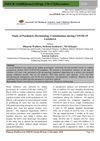 November 2021 in “Journal of the European Academy of Dermatology and Venereology”
November 2021 in “Journal of the European Academy of Dermatology and Venereology” 2021 saw a slow return to normalcy and increased scientific engagement despite COVID-19 challenges.
 November 2021 in “World Family Medicine Journal /Middle East Journal of Family Medicine”
November 2021 in “World Family Medicine Journal /Middle East Journal of Family Medicine” Third booster shots enhance the immune system's response to the COVID-19 virus.
September 2021 in “Journal of the American Academy of Dermatology” CTCL patients can safely continue treatment during COVID-19 with proper safety measures.
[object Object] August 2021 in “Journal of the American Academy of Dermatology” The study evaluated how alopecia areata severity relates to its psychosocial effects on patients.
 April 2021 in “Rheumatology”
April 2021 in “Rheumatology” An 80-year-old man with COVID-19 also had constrictive pericarditis, possibly due to an autoimmune or immunoglobulin related disease, and improved after surgery.
 December 2020 in “Journal of medical science and clinical research”
December 2020 in “Journal of medical science and clinical research” Most child skin problems during the COVID-19 lockdown were not emergencies and could have been handled by teleconsultation.
202 citations,
January 2022 in “Journal of Clinical Medicine” Women are more likely to have long-term post-COVID symptoms than men.
 41 citations,
February 2021 in “Cureus”
41 citations,
February 2021 in “Cureus” Dutasteride treatment in men with mild to moderate COVID-19 reduced viral shedding, inflammation, and recovery time without serious side effects.
35 citations,
March 2021 in “BMJ Open Respiratory Research” Older age, being male, and Asian ethnicity led to worse COVID-19 outcomes, with many experiencing long-term symptoms.
 13 citations,
July 2020 in “bioRxiv (Cold Spring Harbor Laboratory)”
13 citations,
July 2020 in “bioRxiv (Cold Spring Harbor Laboratory)” Four drugs were found that could potentially treat COVID-19 by inhibiting the virus in lab tests.
 5 citations,
December 2022 in “Annals Academy of Medicine Singapore”
5 citations,
December 2022 in “Annals Academy of Medicine Singapore” Some skin medications can have harmful interactions with the COVID-19 drug nirmatrelvir-ritonavir, but not with molnupiravir.
 5 citations,
July 2021 in “medRxiv (Cold Spring Harbor Laboratory)”
5 citations,
July 2021 in “medRxiv (Cold Spring Harbor Laboratory)” Proxalutamide significantly lowered hospitalization rates in women with mild-to-moderate COVID-19.
 4 citations,
May 2021 in “Journal of The American Academy of Dermatology”
4 citations,
May 2021 in “Journal of The American Academy of Dermatology” There's no significant genetic link between male pattern baldness and COVID-19.
 3 citations,
October 2022 in “Hormone and Metabolic Research”
3 citations,
October 2022 in “Hormone and Metabolic Research” Male hormones may increase the severity and death rates of COVID-19.
 3 citations,
September 2022 in “Frontiers in psychiatry”
3 citations,
September 2022 in “Frontiers in psychiatry” University students in Egypt experienced high stress during COVID-19's third wave, with negative coping mechanisms being more common.
 3 citations,
January 2022 in “Einstein (São Paulo)”
3 citations,
January 2022 in “Einstein (São Paulo)” The pandemic increased stress-related skin conditions and those affected by behavior changes.
 2 citations,
December 2021 in “F1000Research”
2 citations,
December 2021 in “F1000Research” Most people in South India lack knowledge about managing COVID-19 at home.
 1 citations,
November 2022 in “F1000Research”
1 citations,
November 2022 in “F1000Research” The skin conditions of Iraqi women changed during the COVID-19 pandemic, with more hair loss and skin irritation but fewer contagious skin infections.

Stem cell therapies, especially adipose-derived ones, show promise for treating severe COVID-19 and related conditions.
 February 2024 in “PubMed”
February 2024 in “PubMed” More people experience hair loss after recovering from COVID-19 in hospitals than in outpatient settings.
[object Object] December 2023 in “International journal of research publications” Herbal medicine and nutraceuticals may help treat Post COVID-19 Syndrome, but more research is needed.
 September 2022 in “JAMC. Journal of Ayub Medical College, Abbotabad, Pakistan/Journal of Ayub Medical College”
September 2022 in “JAMC. Journal of Ayub Medical College, Abbotabad, Pakistan/Journal of Ayub Medical College” A boy with a rare skin condition improved quickly after starting zinc supplements.
May 2022 in “Gastroenterology” Supplemental testosterone may lower liver cancer risk in hepatitis C patients.
April 2022 in “Research review”  January 2022 in “International Journal of Nutrology”
January 2022 in “International Journal of Nutrology” Diet and nutrients, including lycopene from tomatoes and hydroquinone from wheat, can help control melasma, a skin condition.
 December 2021 in “Australasian Journal of Dermatology”
December 2021 in “Australasian Journal of Dermatology” Red stripes on nails and hair loss may occur after COVID-19.
September 2021 in “Psychoneuroendocrinology” Nurses had higher stress levels during intense phases of the COVID-19 pandemic.
 July 2020 in “Hair transplant forum international”
July 2020 in “Hair transplant forum international” Androgens might play a role in the severity of COVID-19.
 January 2020 in “arXiv (Cornell University)”
January 2020 in “arXiv (Cornell University)” Some existing drugs and natural products might work against COVID-19 by targeting the virus's main protease.





















